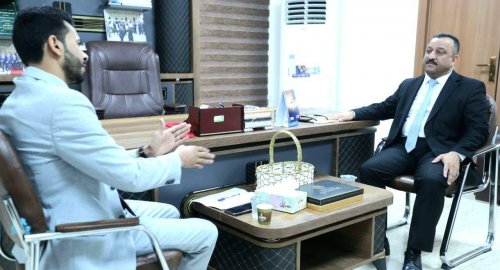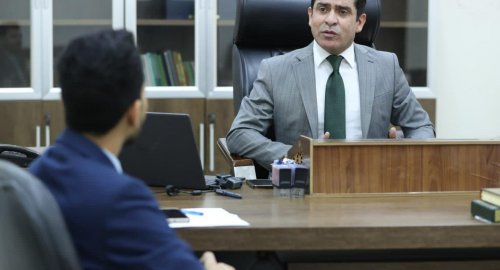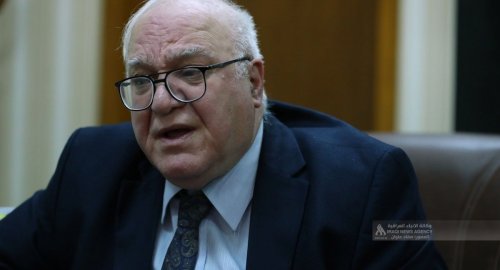
INA interviews Judge of Integrity Misdemeanor Court concerning economic crimes and integrity cases

- 10-11-2023, 12:11
INA- Baghdad
The Integrity Misdemeanor Court said on Friday, that its work is specialized in cases filed on money laundering and economic crimes, clarifying the legal articles and penalties for integrity cases.
The court's judge, Maysoon Muhammad Issa, told the Iraqi News Agency (INA) that "The work of the court is concerned with cases related to integrity, economic crimes and money laundering, crimes of breach of job duties are punishable by up to 5 years in prison stipulated in the Iraqi Penal Code, pointing out that the court has been established since 2016.
Money laundering
Judge Issa explained that "money laundering is the collection of huge amounts of money illegally resulting from several operations, such as drug trafficking, smuggling of oil derivatives or antiquities," noting that "these funds are hidden by transferring or transporting them without drawing attention by establishing a chain of restaurants or commercial centers or importing certain goods at cost, and therefore there is a merger between illegally obtained funds with commercial funds, which makes it difficult to track these funds and its sources."
Issa said that “Iraq began early eliminate this type of crime by legislating laws, including (the Anti-Money Laundering and Terrorism Financing Law No. 39 of 2015 and the Illicit Gains Law), which addressed the inflation of employees' funds, but the legislation is incomplete in terms of including all categories such as ordinary citizens.
She continued that "Iraq has come a long way to get out of the black list of money laundering by meeting the conditions and all obligations towards the recommendations of the automated working group, in which the Central Bank of Iraq and the Anti-Money Laundering Office made all efforts to put Iraq in a good position among the rest of the countries of the region such as Turkey, Egypt and Saudi Arabia," confirming that "The penalty for crimes affecting the national economy in this court is imprisonment."
Economic crimes
Issa pointed out that "the most economic crimes are the crime of financial transfers that take place by exchange outlets and offices not licensed by the Central Bank of Iraq, as well as the sale of dollars at prices contrary to the instructions of the Central Bank of Iraq, and from people, outlets and offices not licensed by the Central Bank of Iraq."
Beauty centers and medical laboratories
"There are other economic crimes such as opening beauty centers, medical laboratories and pharmacies without obtaining the approval of the competent authorities represented by the Ministry of Health and the Pharmacists Syndicate," she said.
Issa added that "economic crimes also include the possession of expired materials or non-conforming to the standard specifications approved by the Central Organization for Standardization and Quality Control, which has an impact on consumer protection in addition to promoting the sale of nutritional supplements or slimming through social networking sites by non-specialists and the spread of the phenomenon of network marketing and under the name of fake companies for currency trading and stocks."
Judge Issa continued "As well as practicing the profession of pharmacy by non-specialized persons, imitating trademarks, practicing the activity of transporting goods without the approval of the General Company for Post and Savings, and trading in counterfeit antiquities, not archaeological, because trading in antiquities constitutes crimes as a felony and not misdemeanors.”
Activating the Regulatory Bodies
She explained that "Iraqi laws are firm regarding economic crimes through the legislation of laws, but the weakness lies in the competent regulatory bodies that are responsible for monitoring illegal cases and referring them to the judicial authority," stressing "the need to supplement the regulatory side for the purpose of intensifying its procedures and forming an integrated action plan to limit cases of manipulation in the Iraqi market and coordination between the Ministry of Health and the syndicates of pharmacists and doctors on the one hand and the Directorate of Combating Organized Crime from Another entity for the purpose of forming mobile work teams to monitor the opening of beauty centers, pharmacies and doctors' clinics that are not licensed by the competent authorities."
Judge Issa concluded saying that "Iraqi laws address all obstacles facing Iraqi society, but the problem lies in implementation, as it is necessary to provide the necessary devices for the purpose of developing an organized and integrated mechanism to monitor cases of economic crimes and take appropriate legal measures."
PM: Our goal is to stop gas flaring at zero percent by 2028
- politics
- 04:02
South Korean cops raid offices of Jeju Air as crash probe intensifies
- International
- 02:10
Suspected people smugglers to face severe curbs under new UK laws
- International
- 02:00
Iraq vs Saudi Arabia match kicks off, Arabian Gulf Cup 26
- Sport
- 24/12/28
Real Madrid becomes Arnold's new home
- Sport
- 24/12/28
Globe Soccer Awards 2024: all the nominees
- Sport
- 24/12/27
CBI: We have achieved a great achievement in abroad remittance
- Economy
- 25/01/01












